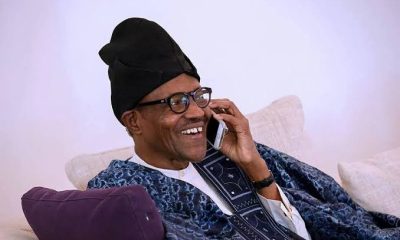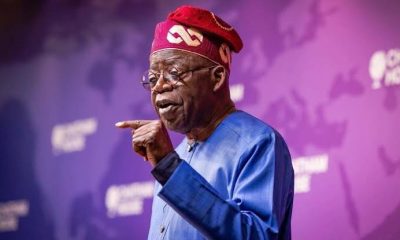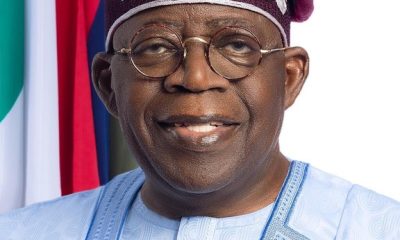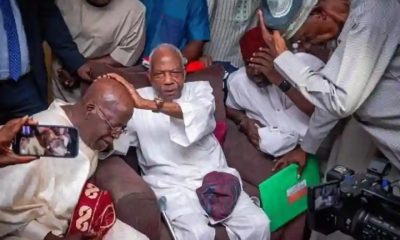Headline
Reuters: Baba Go-fast? Nigeria’s Tinubu Stuns Wary Investors With Quick Reforms
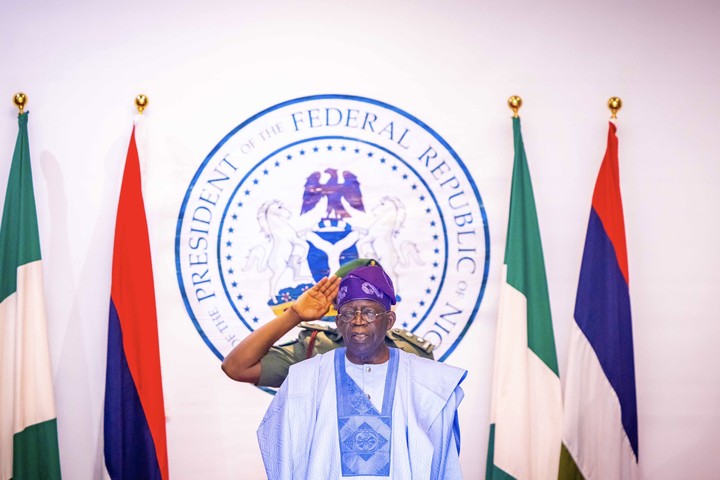
Nigeria’s new president, in office for less than a month, is pushing to put Africa’s largest economy on a reform track that investors have eyed for decades, fuelling excitement that money could flow to a nation that many had deemed uninvestible.
President Bola Tinubu’s bold actions, including removing restrictions on the naira currency that allowed it to hit a record 790 to the dollar and subsidy removals that tripled petrol prices, could take stress off the battered finances of Africa’s largest economy.
But investors, burned by previous reforms that ultimately proved hollow, say it will take time to build trust and listed myriad questions over the final shape of the economy.
“The reaction is one of, ‘finally’,” said Tunde Ajileye, a partner at Lagos-based SBM Intelligence. “If this stays, then it would mean that (Tinubu) had been able to remove the two subsidies that have crippled Nigeria fiscally and monetarily for the last decade.”
Tinubu is from the same party as predecessor Muhammadu Buhari, dubbed “Baba Go-slow” for his pottering pace – taking six months to appoint cabinet members.
By contrast, Tinubu lifted fuel price caps days after taking office on May 29, suspended controversial Central Bank chief Godwin Emefiele some 10 days later and on Wednesday removed FX restrictions.
The tangle of multiple exchange rates for everything from international school fees to food imports created foreign currency shortages and hobbled investment due to issues getting money out.
“Just the fact that you have seen quite a bit of movement in a relatively short space of time has gotten a lot of people in the market excited,” said Goldman Sachs economist Andrew Matheny.
Nigeria’s international dollar bonds and the country’s stock market have been boosted by the speedy reforms.
BACKLOG, AND BURNED BEFORE
Investors, though, remained wary, citing years of damaging currency controls; Goldman Sachs pegged the backlog of FX demand at a staggering $12 billion.
“We are still to see whether this will allow the FX backlog to clear, where the new market rate will stabilise, whether this will catalyse inflows into the country and … that there will be no issues pulling money out of the country,” said John Mumo, a partner at Blakeney, an Africa-focused equities fund management firm.
Joe Delvaux, a portfolio manager at Europe’s largest asset manager Amundi, said it could take months or more to lure longer-term cash.
“Ultimately, you also have to keep in mind that the biggest provider of FX will still be the CBN,” Delvaux said.
“We need to see that the system works.”
Tinubu will also have to tackle the perennial corruption that has hobbled the country for decades. Nigeria is ranked 150 out of 180 in Transparency International’s 2022 corruption perceptions index – and has been on a downward trend since 2016.
Investors also worry about low tax receipts and falling oil output – structural reforms that will take far longer to sort.
Some are also hoping to see a more orthodox interest rate policy. Inflation hit a near 20-year high of 22.41% in May and a weakening naira will amplify price pressures. Meanwhile interest rates, which Tinubu has said he would like to see fall, were hiked by 50 bps last month to 18.5%.
“Investors will need to see positive real rates and evidence that they will be able to repatriate their earnings before local currency debt is back in play,” said Patrick Curran, senior economist at Tellimer.
Headline
EFCC bars dollar transactions, orders embassies to charge in naira

The Economic and Financial Crimes Commission has barred foreign missions based in Nigeria from transacting in foreign currencies and mandated them to use Naira in their financial businesses.
The EFCC has also mandated Nigerian foreign missions domiciled abroad to accept Naira in their financial businesses.
The anti-graft agency said the move is to tackle the dollarisation of the Nigerian economy and the degradation of the naira
The Commission, therefore, asked the government to stop foreign missions in Nigeria from charging visa and other consular services in foreign denominations.
The EFCC gave the advisory in a letter to the Minister of Foreign Affairs, Amb. Yusuf Tuggar, for onward transmission to all foreign missions in the country.
In the letter, the EFCC said it issued the advisory because the practice of paying for consular services in dollars was in conflict with extant laws and financial regulations in Nigeria.
In a letter dated April 5, 2024, which was addressed to the Minister of Foreign Affairs, Ambassador Yusuf Tuggar, titled: “EFCC Advisory to Foreign Missions against Invoicing in US Dollar,” the EFCC Chairman, Ola Olukoyede expressed dismay over the invoicing of consular services in Nigeria by foreign missions in dollars.
The EFCC cited Section 20(1) of the Central Bank of Nigeria Act, 2007, which makes currencies issued by the apex bank the only legal tender in Nigeria.
The letter read, “I present to you the compliments of the Economic and Financial Crimes Commission, and wish to notify you about the commission’s observation, with dismay, regarding the unhealthy practice by some foreign missions to invoice consular services to Nigerians and other foreign nationals in the country in United States dollar ($).
“It states that ‘the currency notes issued by the Bank shall be the legal tender in Nigeria on their face value for the payment of any amount’.
“This presupposes that any transaction in currencies other than the naira anywhere in Nigeria contravenes the law and is, therefore, illegal.”
The commission further stated that the rejection of the naira for consular services in Nigeria by certain missions, along with non-compliance with foreign exchange regulations in determining service costs, is not just unlawful but also undermines the nation’s sovereignty embodied in its official currency.
The letter continues: “This trend can no longer be tolerated, especially in a volatile economic environment where the country’s macroeconomic policies are constantly under attack by all manner of state and non-state actors.
“In light of the above, you may wish to convey the commission’s displeasure to all missions in Nigeria and restate Nigeria’s desire for their operations not to conflict with extant laws and regulations in the country.”
Diplomatic sources said yesterday, May 10, that some embassies were wondering whether the EFCC’s advisory represented the position of the Federal Government.
Headline
Prince Harry visits sick Nigerian soldiers in Kaduna

Prince Harry and his team visited the 44 Nigerian Army Reference Hospital in Kaduna to interact with wounded soldiers who are receiving treatment.
The Duke of Sussex is in Nigeria with his wife to champion the Invictus Games, which Harry founded to aid the rehabilitation of wounded and sick servicemembers and veterans.
Nigeria joined the Invictus Community of Nations in 2022 becoming the first African country to join.
Prince Harry’s visit to Kaduna came 68 years after his late grandmother Queen Elizabeth II visited the state during the time of the late Premier of Northern Region Sir Ahmadu Bello.




-

 Headline6 days ago
Headline6 days agoPrince Harry visits sick Nigerian soldiers in Kaduna
-

 Entertainment6 days ago
Entertainment6 days agoAMVCA Cultural Day: BBNaija’s Neo, Venita win Best Dressed Male, Female
-

 Metro6 days ago
Metro6 days agoEx-Sports Minister laments after hospital neglected him for hours over N80000 deposit
-

 Headline6 days ago
Headline6 days agoEFCC bars dollar transactions, orders embassies to charge in naira



